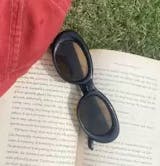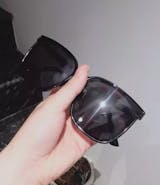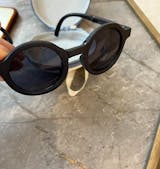FAQ
1. Why should I wear sunglasses?
A: Sunglasses protect your eyes from harmful UV rays, reduce eye strain in bright conditions, and shield your eyes from environmental elements such as wind, dust, and sand. They can also enhance your vision in bright conditions by reducing glare.
2. What is UV protection in sunglasses?
A: UV protection refers to the ability of sunglasses to block harmful ultraviolet (UV) rays from the sun. There are two types of UV rays: UVA and UVB. Both can damage your eyes over time. Quality sunglasses offer 100% UV protection, blocking both UVA and UVB rays.
3. What are polarized sunglasses?
A: Polarized sunglasses have lenses with a special filter that reduces glare from reflected light. They are especially useful for activities like driving, fishing, and skiing, where reflected light can cause visibility issues.
4. How do I know if my sunglasses offer UV protection?
A: Many sunglasses come with a sticker or tag indicating UV protection. However, the absence of a sticker doesn't necessarily mean they don't offer protection. To be sure, you can have them tested at an optometrist's office.
5. How do I choose the right frame size for my face?
A: Sunglasses come in various sizes and shapes. To find the right fit, consider your face shape (e.g., oval, round, square) and choose a frame that complements it. It's also important to ensure the sunglasses sit comfortably on your nose and don't touch your cheeks.
6. Are more expensive sunglasses better?
A: Not necessarily. While many high-end brands offer quality lenses and frames, you can also find affordable sunglasses that offer 100% UV protection and other essential features. The key is to check for UV protection and ensure they fit well.
7. Can I wear sunglasses over my prescription glasses?
A: Yes, there are clip-on or fit-over sunglasses designed to be worn over prescription glasses. Alternatively, you can also get prescription sunglasses tailored to your vision needs.
8. How can I clean my sunglasses?
A: Use a microfiber cloth to wipe away dust and smudges. For a deeper clean, you can use lukewarm water and a tiny drop of dish soap. Gently rub the lenses and frame, then rinse and dry with a microfiber cloth.
9. Can sunglasses get damaged if left in the car?
A: Prolonged exposure to high temperatures can damage the sunglasses' frame and lens coatings. It's best to avoid leaving them in the car, especially on hot days.
10. Are there sunglasses suitable for sports?
A: Yes, there are sports sunglasses designed with features like anti-fog, grip-enhancing nose pads, and shatterproof lenses. They offer protection and clarity during activities like cycling, running, and skiing.





























